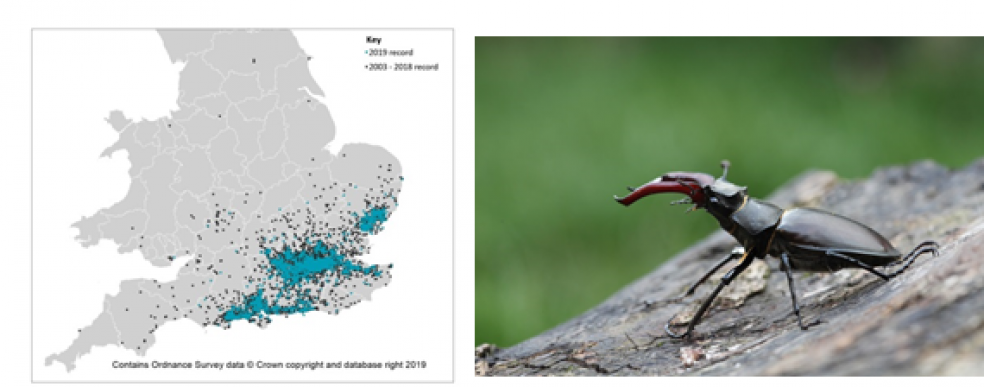
Wildlife charity PTES launches a ‘Stag Weekend’ with a difference
Wildlife charity People’s Trust for Endangered Species (PTES) is calling for people across the UK to take part in their ‘Stag Weekend’ – a new national effort to help save – and celebrate - threatened stag beetles this summer.
This is a Stag Weekend with a difference, and one that can take place during lockdown too. From Friday 5th – Sunday 7th June, PTES is encouraging anyone with a garden or an allotment to help the UK’s largest land beetle, by recording any sightings and making their green spaces more stag beetle friendly. Those without a garden can keep their eyes peeled for stag beetles on their daily walk, and there are fun activities for children too, including ‘meet the stag beetle’ and a ‘beetle olympics’.
Gardens are a haven for all sorts of wildlife, and there are lots of ways to turn any green space into a stag beetle sanctuary. Creating log piles and pyramids, and leaving dead wood to rot down in the soil, makes the perfect habitat for these beautiful, but rare, beetles.
People across the UK are also being asked to record any sightings of stag beetles over the Stag Weekend (and beyond) as part of PTES’ annual Great Stag Hunt survey, which has been running since 1998 and last year saw over 8,000 sightings. Stag beetles typically emerge from the ground from late May onwards, and are most likely to be spotted when flying around on warm, summer evenings. PTES is particularly keen to hear of any sightings from those living on the edge of their natural range, in counties such as Norfolk, Cheshire, Bedfordshire, Somerset, Lincolnshire, Northamptonshire and Shropshire.
Laura Bower, Conservation Officer at PTES, explains: “Stag beetles were once a common sight, but they’ve declined - mostly due to habitat loss - and have even become extinct in some parts of Europe. We can’t let that happen in the UK, which is why we’re encouraging as many people as possible to help save these spectacular insects by joining our Stag Weekend, making small changes to their gardens and by telling us about any sightings. These simple actions will allow us to understand exactly where stag beetles are still living and they where they need most help.”
Male stag beetles are easy to spot, as they have impressive, large mandibles (jaws) that resemble the antlers of a stag, and can grow up to 75mm in length. They may look intimidating, but stag beetles are harmless. Females are smaller (growing up to 50mm in length), with smaller mandibles. Stag beetles spend most of their lives (which can range between three and five years depending on the weather) underground as larva, only emerging for a few weeks in the summer to find a mate.
Woodland edges, hedgerows, traditional orchards, parks and gardens throughout much of Europe and Britain, but not Ireland, are where stag beetles call home. They’re now mostly seen in the southern counties of England, the Severn Valley and in the coastal areas of the southwest, where the average temperature is higher and rainfall is lower. In other parts of Britain, they are extremely rare and in some places, extinct.
Laura continues: “The biggest threat stag beetles face is habitat loss. Many green spaces are being developed and dead or decaying wood in woodlands, parks and gardens is being removed, which is a huge problem as dead and decaying wood acts as a habitat as well as a food source. A recent study published in Science found that land-based insects worldwide have been declining at almost 9% per decade, which is really worrying and sadly includes the UK. But there are ways we can all help, and we hope that our Stag Weekend will highlight the beauty – and the plight - of these beetles, and that people across the country will be inspired to help save them.”
Ahead of the Stag Weekend, PTES will be posting top tips showing how to help stag beetles at home, by sharing engaging how to videos and hosting a stag beetle quiz on their social media channels. These have been created in partnership with Back from the Brink’s Ancients of the Future project, led by Buglife, and can be found on Facebook, Twitter and Instagram from the 1st June.
The Ancients of the Future project is securing the future of our ancient tree landscapes and the species that depend upon them. Lack of maturing trees, dead and decaying wood has led to the loss of many of our specialist deadwood species such as stag beetles. In partnership with PTES, the project aims gain new records at the edge of their known range and raise awareness around the importance of protecting this iconic species.
To learn how you can help stag beetles, visit www.ptes.org/stagbeetles. If you’re on social media PTES would love to see your stag beetle photos using #StagWeekend.










